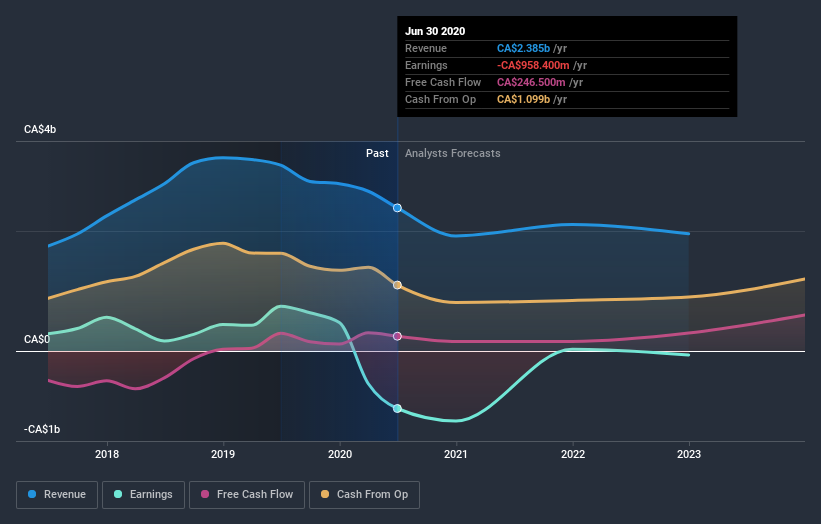What You Need To Know About Seven Generations Energy Ltd.'s (TSE:VII) Investor Composition

Every investor in Seven Generations Energy Ltd. (TSE:VII) should be aware of the most powerful shareholder groups. Generally speaking, as a company grows, institutions will increase their ownership. Conversely, insiders often decrease their ownership over time. Companies that used to be publicly owned tend to have lower insider ownership.
Seven Generations Energy isn't enormous, but it's not particularly small either. It has a market capitalization of CA$1.3b, which means it would generally expect to see some institutions on the share registry. Our analysis of the ownership of the company, below, shows that institutions own shares in the company. Let's take a closer look to see what the different types of shareholders can tell us about Seven Generations Energy.
View our latest analysis for Seven Generations Energy
What Does The Institutional Ownership Tell Us About Seven Generations Energy?
Institutions typically measure themselves against a benchmark when reporting to their own investors, so they often become more enthusiastic about a stock once it's included in a major index. We would expect most companies to have some institutions on the register, especially if they are growing.
As you can see, institutional investors have a fair amount of stake in Seven Generations Energy. This suggests some credibility amongst professional investors. But we can't rely on that fact alone since institutions make bad investments sometimes, just like everyone does. When multiple institutions own a stock, there's always a risk that they are in a 'crowded trade'. When such a trade goes wrong, multiple parties may compete to sell stock fast. This risk is higher in a company without a history of growth. You can see Seven Generations Energy's historic earnings and revenue below, but keep in mind there's always more to the story.
Seven Generations Energy is not owned by hedge funds. Our data shows that Canada Pension Plan Investment Board is the largest shareholder with 17% of shares outstanding. In comparison, the second and third largest shareholders hold about 13% and 4.5% of the stock.
A deeper look at our ownership data shows that the top 25 shareholders collectively hold less than half of the register, suggesting a large group of small holders where no single shareholder has a majority.
Researching institutional ownership is a good way to gauge and filter a stock's expected performance. The same can be achieved by studying analyst sentiments. Quite a few analysts cover the stock, so you could look into forecast growth quite easily.
Insider Ownership Of Seven Generations Energy
The definition of company insiders can be subjective and does vary between jurisdictions. Our data reflects individual insiders, capturing board members at the very least. Management ultimately answers to the board. However, it is not uncommon for managers to be executive board members, especially if they are a founder or the CEO.
Most consider insider ownership a positive because it can indicate the board is well aligned with other shareholders. However, on some occasions too much power is concentrated within this group.
Our information suggests that Seven Generations Energy Ltd. insiders own under 1% of the company. It seems the board members have no more than CA$5.3m worth of shares in the CA$1.3b company. I generally like to see a board more invested. However it might be worth checking if those insiders have been buying.
General Public Ownership
The general public -- mostly retail investors -- own 51% of Seven Generations Energy. This level of ownership gives retail investors the power to sway key policy decisions such as board composition, executive compensation, and the dividend payout ratio.
Next Steps:
It's always worth thinking about the different groups who own shares in a company. But to understand Seven Generations Energy better, we need to consider many other factors. Take risks for example - Seven Generations Energy has 2 warning signs (and 1 which makes us a bit uncomfortable) we think you should know about.
If you are like me, you may want to think about whether this company will grow or shrink. Luckily, you can check this free report showing analyst forecasts for its future.
NB: Figures in this article are calculated using data from the last twelve months, which refer to the 12-month period ending on the last date of the month the financial statement is dated. This may not be consistent with full year annual report figures.
This article by Simply Wall St is general in nature. It does not constitute a recommendation to buy or sell any stock, and does not take account of your objectives, or your financial situation. We aim to bring you long-term focused analysis driven by fundamental data. Note that our analysis may not factor in the latest price-sensitive company announcements or qualitative material. Simply Wall St has no position in any stocks mentioned.
Have feedback on this article? Concerned about the content? Get in touch with us directly. Alternatively, email editorial-team@simplywallst.com.

 Yahoo Finance
Yahoo Finance 

